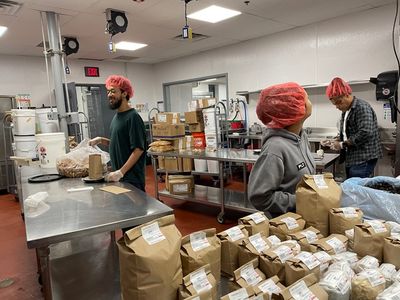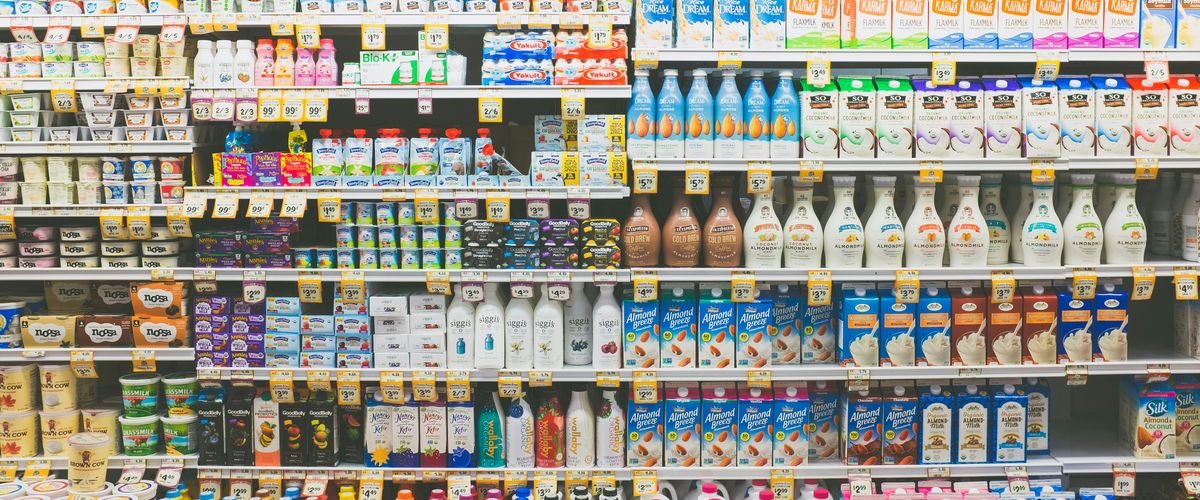Taking the Plastic Out of Grocery Shopping
Photo by Kenny Eliason on Unsplash

Alys Myers cares about the earth and for years volunteered to lead a recycling program for her coworkers. But the lifelong environmentalist was taken aback when she learned about the Great Pacific Garbage Patch and the risks from microplastics in our food supply. The eco-awakening transformed her outlook on basically everything.
“You fall down the rabbit hole,” says Myers (’86, COM’88). “As you learn more and more and more, you’re like, ‘Oh my God, this is just overwhelming.’”
But instead of becoming numb, Myers put her conviction into action. In 2021, she founded SUPPLY Bulk Foods, a zero-waste dry bulk food store that seeks to address the two-headed monster of food insecurity and climate change. In all, 95 percent of plastics used in food and beverage packaging—nearly 150 metric tons a year globally—goes into landfills, according to the World Economic Forum. SUPPLY offers an online menu of hundreds of dry goods—from pastas to chocolate to flour—that are available for pickup at more than 20 locations in eastern Massachusetts. All dry goods are packed in biodegradable or compostable packaging. Myers says her revenues increase around 20 percent each year, and she now employs three kitchen workers and a part-time business manager.
“You need to show people how to go plastic-free,” Myers says. “Make it easy for them.”
Mastering the pivot

Myers’ career might be defined by the pivot. Fresh off graduation from BU’s College of Communication, Myers edited commercials for CableVision, moved to Los Angeles to work in the film industry, and eventually landed back in Boston as a fine artist. She was an office manager in the Center for Community Health Improvement at Massachusetts General Hospital, where she chaired the hospital’s recycling committee. Myers implemented several environmental initiatives in her 14 years at MGH, including a website where employees could post and swap office furniture and supplies they were discarding. When she left MGH in 2017, she took some time to figure out what should come next.
Myers was volunteering in her neighborhood, stocking the community refrigerator, when she was taken aback by another societal reality. This time, it wasn’t plastic waste. It was food insecurity.
“You’d start putting stuff in the shelves, and you’d turn around and there would be this huge line behind you. I was like, ‘Oh my God, this is a huge problem,’” Myers says. “I’ve pivoted a number of times in my life, and each time I feel like the only way to do it is to just stop so you can think, and then take in everything that’s going on around you. I feel like the universe kind of tells you what to do.”
It turns out, the universe contributed to Myers’ idea for a grocery model that could address food insecurity in an eco-friendly way. She did reconnaissance work as the bulk dry food manager at a small grocery store in Somerville while she put the finer points on her business plan. Then it was time to strike out on her own.
A business is born

SUPPLY Bulk Foods debuted in August 2021. Amid the COVID-19 pandemic, many Boston-area families found her contact-free model attractive. Myers works with producers and distributors that are mostly small, local, and BIPOC-owned. She stocks the staples—nuts, pastas, dry ingredients—and adds products that her customers request. The process is easy: A customer chooses from an extensive food menu on SUPPLY’s website and pays for it online. Working out of Commonwealth Kitchen, a nonprofit food business incubator in Dorchester, Myers tallies the items each customer orders, which her kitchen staff then packs up. The customer picks up their bulk order at one of several locations in Boston, Cambridge, Dedham, Norwood, Marshfield, Medford, Lexington, Arlington, Beverly, or Carver. Orders over $200 include free home delivery, as long as the customer lives within 12 miles of Commonwealth Kitchen.
Myers focuses on keeping her prices reasonable and accepts SNAP/EBT from low-income customers. She recently partnered with the nonprofit Action for Boston Community Development (ABCD) and HRI, a Cambridge-based affordable housing development and management company, to provide bulk dry food to their low-income residents. In both of these partnerships, program participants would sign up for up to five different products and then pick them up from the agencies on a particular day. All of her products are plastic-free, of course.
Myers envisions a future where SUPPLY Bulk Foods (or a similar grocer) exists in every city, until food insecurity and plastics disappear for good. She aims to open her first brick-and-mortar location in the next year or two. For now, she is content finding new and creative ways to meet the growing demand for dry bulk foods, with less packaging, in eastern Massachusetts. A former artist who has worked in sculpture, jewelry design, and installations, Myers finds she can draw on that experience in many ways.
“I’m an artist at heart, and honestly I think that is the best background for an entrepreneur,” she says. “When you’re an artist, you’re doing everything yourself. You learn marketing, you learn budgeting, you learn everything. I don’t have much time to make art anymore, but I really feel like what I’m doing right now is the most creative thing I’ve ever done.”
